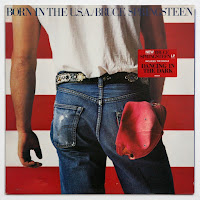1984
4 keepers
keeper avg .333
After taking a detour into the great plains with just his acoustic guitar and a tape recorder to release Nebraska (1982) the "Boss" returned to the office for his follow-up to The River (1980). He had been working on dozens of songs since then, but hadn't been able to form them into a cohesive album until producer Jon Landau prompted him to pen the overtly poppy single "Dancing in the Dark." The now-completed album produced six more singles and went on to become the holy crap 25th highest-selling album of all time. What the heck insight can I possibly offer? Without delving into the themes of politics and class struggle, what I hear is The River II, pumped up with pounding percussion and then smoothed out by keyboardist Roy Bittan's smooshy synths.
While this description fits the frequently misunderstood title song**** to a tee, the stealthily righteous politics and the emotion embodied in the entire group's performance allow the song to transcend its production by sheer force. Springsteen lets loose an electrifying riff on his Telecaster/Esquire to commence the celebratory "Glory Days"****, which again is summed up with an ironic chuckle at the narrator's own expense. But Springsteen's status as a pop music star was cemented by his Billboard #2 dance-pop single "Dancing in the Dark"****, a vast departure from any of his previous work but still a great song. And the somber but wistful "My Hometown" nicely describes the true "state of the union" at the peak of the Reagan era. Other singles included the raucous, blues-y "Cover Me", the slow-burning "I'm on Fire", and average bar band rocker "I'm Goin' Down"; incredibly, all hit the top ten.
Though the modern production and streamlined compositions did serve to focus the material and probably allowed Springsteen to reach a broader audience, sometimes the result suffered along the way. "I'm Goin' Down," which unbelievably charted as highly as "Born in the U.S.A," is especially monotonous, with a 3-note vocal melody and the same I-V-VI-IV progression the entire time. Bittan's droopy, new age-y synths frequently sound out of place, especially on the dreary "Downbound Train." Though the worst that can be said about "Darlington County" and "No Surrender" is that they're nothing new, they're still lesser versions of previous Springsteen songs. The energetic "Bobby Jean"**** also hews closely to the sound of previous albums ("Out in the Street" or "The Promised Land" (1978) for example); fortunately its bittersweet longing is one of Springsteen's fortes, and it comes complete with a legendary Clarence Clemons sax solo. And "Working on the Highway" is a fun little exercise in rockabilly.

Comments